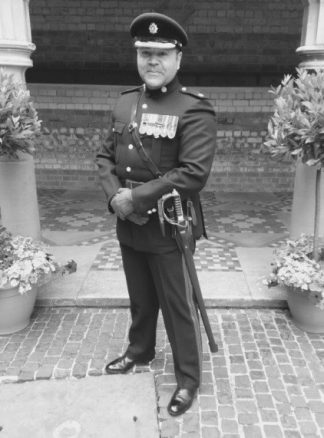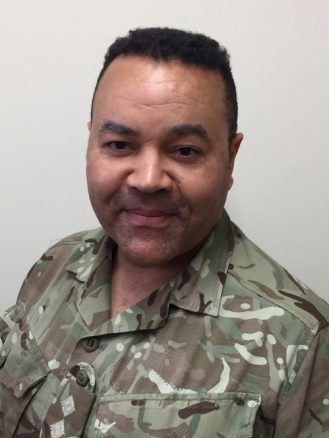
Hi Herb, thank you for taking the time to talk to us. What does Black History Month mean for you?
To me Black History month is both a celebration and remembrance of those members of the black community who have contributed to the history and development of the United Kingdom, both military and civilian.
When did y ou join the regular Army, and what made you join?
ou join the regular Army, and what made you join?
I joined the Regular Army in January 1994 as a soldier and started my basic training at the Army Training Regiment at Pirbright with the Royal Electrical and Mechanical Engineers (REME), to become an electronics technician. My uncle had served in the Royal Air Force back in the 1960’s and had encouraged me to join the British Forces.
What did your family think about you joining at the time?
I was born and grew up in Zimbabwe to a white father and black mother, the middle of 5 children. My family were supportive but my father was unsure as to whether I would enjoy serving in the Army, but I saw it as an adventure and a challenge.
You are now an Army Reservist. What does this mean?
I served over 17 years in the Regular Army and reached the rank of Major in the Royal Logistics Corps (RLC). When I left, I felt I still had a lot to offer so I joined the Territorial Army, now known as the Army Reserve (AR), and immediately took over command of 580 Transport Squadron in Cardiff, part of the Welsh Transport Regiment RLC. The Reserves offers me the option to still do what I enjoy in the Army one weekend a month and still pursue a full career in civvie street.
What job do you currently do in the Army?
I am currently the Permanent Staff Officer with 105 Battalion REME managing all the day to day running of the unit, managing a team of military and civilians.
What achievement are you most proud of?
I suppose my proudest achievement in my Army career was walking up the Old College steps at the Royal Military Academy Sandhurst (RMAS) at my passing out parade when I commissioned as a 2nd Lieutenant into the Royal Logistics Corps. My parents were there and that moment made my parents very proud. At the time, there was an average of one non-white British entrant per year to the RMAS out of some 900+ entrants in year. Yes, there were other BAME officer cadets from other countries but the British BAME cadets were expected to perform to the highest standard expected of a British Army Officer Cadet. So, you can see why this was such a huge achievement for me to be walking up those steps.
Some people may have a perception about how about how black young people are treated in the Army. What has been your experience been?
I don’t know if I was just lucky or just a case of not letting my colour be an issue but either way I never let it stop me. In any case, I never felt like I didn’t fit in or belong in the Army; from the start I was treated fairly just like everyone else, I think that’s what made me feel included. I suppose because I went through the same training and selection as everyone else and excelled in some cases I become one of the team and developed some really strong friendships that still exist today. The Army gave me an equal opportunity to progress and develop myself that no other career would have given me. The Army has always being about what you have to offer and how far you are willing to challenge yourself. In more recent years, the Army and Armed Forces as a whole have engendered core values and ethos that promote it as a respected employer. This is what makes me proud to serve and be a part of. Yes, no one organisation or people are perfect and some people have been let down or betrayed by the Armed Forces but if anything the Army has learnt from its past mistakes and has made efforts and changes for the better, in some cases better than  private industry. Finally, the Army is not just about joining the Infantry. The Army and Armed Forces as a whole have a whole lot of careers to offer in medicine, engineering, science, law, HR, logistics and leadership.
private industry. Finally, the Army is not just about joining the Infantry. The Army and Armed Forces as a whole have a whole lot of careers to offer in medicine, engineering, science, law, HR, logistics and leadership.
Outside of the Army, what do you enjoy doing?
When I was in the Regular Army, I had a great social life. I chose to get posted to Germany to go see and experience Europe and another country and culture. I went to and saw places I’d never have dreamt of or considered. Yes, I had to go to places that were dangerous and scary but I believed in what I was being sent to do, in my training and most importantly my colleagues, who also believed in me. When I wasn’t deployed or training, I travelled, played sport and did outdoor pursuits that I’d never have done otherwise.
When I left the regulars and joined the Reserves, I had my civilian career and family life but once a month a spent a weekend away with the Army Reserves training or doing something I wouldn’t have done otherwise.
Being in the Reserves gave me the chance to experience the best of both worlds and still earn extra money and skills. Out of work, I enjoy horse riding, skiing, mountain biking, swimming, go-karting, hill walking, watching rugby, keeping fit and mostly doing little build projects about the house.
As a final thing, what piece of advice would you give the 18 year old you?
At 18 years old, the world is your oyster, your body and mind are just coming to their peak in terms of fitness and agility, use them! Whatever colour skin or religion you can do and achieve anything, just as long as you work hard to get it because failure will be your regret for not trying harder. Too many times in the last few years have I met people who say, they wish they had done more with their lives and maybe joined the Forces for a few years and just challenged themselves. I’m glad I did and took every opportunity I was offered or saw. Whatever career you chose, don’t be that person in 20 years’ time who will wish they had done more with their lives or wished they had at least tried harder. Be an inspiration to both yourself and all around and after you.
To learn more about the British Army, have a look at www.army.mod.uk
